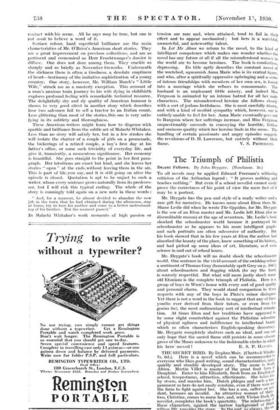The Triumph of Philistia
Decent Fellows. By John Heygate. (Mundanus- 3s.)
To all novels may be applied Edward Freeman's withering criticism of the Arthurian legend : " It proves nothing and teaches nothing." But even if a school novelist cannot easily prove the correctness of his point of view the mere fact of it may be a portent.
Mr. Heygate has the pen and style of a ready writer and a rare gift for narrative. He knows more about Eton than Mr. Shane Leslie did when he wrote The Oppidan, for Mr. Heygate is the son of an Eton master and Mr. Leslie left Eton (for no discreditable reason) at the age of seventeen. Mr. Leslie's book shocked the schoolmaster world because it portrayed the schoolmaster as he appears to his more intelligent pupils, and such portraits are often subversive of authority. list his book showed that in his few years at Eton the author had absorbed the beauty of the place, knew something of its history, and had picked up some ideas of art, literature, and even science in and out of school hours.
Mr. Heygate's book will no doubt shock the schoolmaster world. One sentence in the vivid account of the swishing echoes a sentiment of Thomas Gray (lamentably spelt Grey on p. 166!) about schoolmasters and flogging which (to say the least) is scarcely respectful. But what will more justly shock many old Etonians is the complete triumph of Philistia. Here is a group of boys in Wren's house with every sort of good quality and personal charm. They would stand comparison in arm respects with any of the boys in Plato's minor dialogues. Yet there is not a word in the book to suggest that any of thew youths ever derived from their tutors, or even from tie genius loci, the most rudimentary sort of intellectual stimuli. tion. At times Eton and her traditions have appeared to
be some slight counterblast against the Philistine adoration of physical ugliness and indifference to intellectual beauty
which so often characterizes English-speaking demoeraeY. Mr. Heygate completely shatters such an ideal, and one enn only hope that the sacred flame still persists in some obscure grove of the Muses unknown to the fashionable circles in which








































 Previous page
Previous page